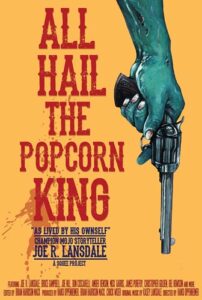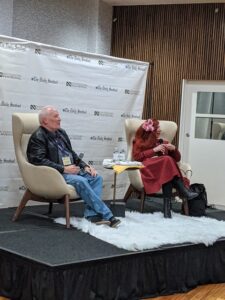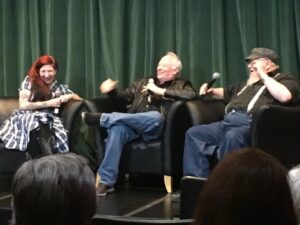All Hail the Popcorn King directed by Hansi Oppenheimer
Squee Projects LLC, 2019
Not Rated
Run time: 55 minutes
Available: on the convention circuit currently; DVD preorders available through website: https://squeeprojects.com/
“If you’ve read Joe Lansdale, you love Joe Lansdale.”
–Mick Garris
Award-winning East Texas-based author Joe R. Lansdale is the focus of director Hansi Oppenheimer’s documentary film, All Hail the Popcorn King. Oppenheimer follows Lansdale as he discusses growing up in Nacogdoches, TX in the 1950s, and what influenced his love of storytelling. Lansdale also talks about how he embarked on his writing career, how he has woven personal experiences into his work, and how he created his own unique genre. Included in the film are interviews with Joe Hill, David J. Schow, Del Howison, Brian Keene, Rick Klaw, Don Coscarelli, Bruce Campbell, James Purefoy, and more.
Watching the documentary, it is clear Lansdale loves history. His eyes light up as he takes Hansi through the community center that used to be the library, discussing historical figures such as Davy Crockett, whose portrait hangs in a display case behind glass. As he talks about his love of drive-ins and movies, especially reminiscing about watching but not hearing films being played at the drive-in from a window, with his mother making up the story unfolding on the big screen, it is apparent where his love of storytelling comes from. Of course, there is much conversation about his works, such as Bubba Ho-Tep, the Hap and Leonard series, The Drive-In, and more. Joe also discusses the martial science he developed, Shen Chuan. Bruce Campbell says of Lansdale, “Do not sneak up on Joe.”
In the summary of the documentary, it reads “We pay homage to one of the Great American Authors.” Indeed, the film accomplishes this. Oppenheimer does a great job weaving the interviews with Joe and everyone else with comic book and drive-in movie style graphics that add a unique touch to the content. Listening to Lansdale talk about his life and history will make anyone want to take it all in. All Hail the Popcorn King belongs on any bookshelf that contains his works, and also provides a great introduction to new and potential readers. Highly recommended.
Reviewed by Lizzy Walker








Follow Us!